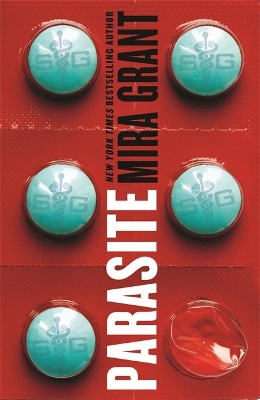Reviewed by jnikkir on
-----------------------------
Parasite was a really surprising -- and interesting -- read for me. And I mean that in two ways. It was surprising and interesting plot-wise, filled with twists and characters that kept me engaged from the beginning. But it was also a surprising and interesting reading experience. Because the more I read of this book, the more I was convinced that it was not something that I usually enjoy -- and the more I realized that I was loving it in spite of my usual taste in books.
First off, for some strange reason, I thought Parasite was supposed to be YA -- it's not. But there was very little in it that would be "strange" to see in YA -- except that the characters are in their mid-twenties, with jobs and careers, instead of being teenagers. So this book would probably appeal to people who stick primarily to YA -- as long as they're okay with the rather stomach-churning main plot point -- parasites. *shudders*
Yeah, it's a gross thing to be dwelling on for the entirety of the book, and I'll admit to a few moments of, "Ew, why am I reading this??" But this was part of my surprising reading experience. Medical thrillers (which this often felt like, despite the sci-fi nature of its overarching premise) really do not interest me when they're in book-form. I'll occasionally cave and watch one on TV, but as books they just don't interest me. But once I was invested in these characters -- the main character, Sal, especially -- I couldn't not keep reading to find out what happened, and I was totally caught up in the story.
Sal (full name Sally, but she prefers Sal) is a young woman who survived a near-fatal car crash. She ended up in a coma for some time, but just before her family decided to pull the plug, she miraculously woke up -- with no memory of her life before the crash. As her doctors explained, her brain-damage-induced amnesia was so acute that not only did she not remember her life, but she actually couldn't form words for some time, and had no knowledge of the social norms that are so second-nature to most people. When the book picks up, it's 6 years after the car crash, and Sal is, essentially, only 6 years old; that is, her life experience is only what she's had since she woke up from her coma. Some colloquialisms are still beyond her, and she still makes some social faux pas because of her amnesia, but this made her all the more charming to me. She's incredibly honest, direct, and strong, considering all she's gone through, and she's the real reason I enjoyed Parasite so much.
The doctors said that she owed her miraculous recovery to her SymboGen implant -- aka, the tube worm that most of the world's population at this time now has living in their bodies. This symbiotic parasite somehow keeps people healthy -- no allergies, automatic distribution of medication (don't ask me how), etc. While I'll admit the pseudo-science behind the parasite still totally baffles me, that didn't really impact my view of the book. It probably could've been "explained" more fully, but ehh. I don't mind. Sal was the real star, for me, so I can deal with some vague hand-waving where the science/sci-fi stuff is concerned.
The main plot of Parasite revolves around a strange "sleeping sickness", which affects certain people who have the SymboGen implant (granted, this is most of the human population, soooooo yeah). Sal and her boyfriend Nathan, a parasitologist who incidentally does not have the SymboGen implant (YAY, someone who thinks they're as creepy as I do, lol), end up getting mixed up in quite a few of these strange incidents, the people around them seeming to go to sleep and then waking up only to attack those around them while "sleepwalking". Sal and Nathan start to realize that SymboGen isn't being quite as truthful as they should be (surprise, surprise), and things... escalate from there.
Parasite is told mostly from Sal's point of view, but between each chapter are short interviews, news-clippings, and excerpts from biographies of certain scientists involved with SymboGen. I thought I'd find these between-chapter excerpts boring, but throughout the book they actually grew on me, and added a sense of foreboding, while giving the book a grounding in (albeit fake) news and magazines that made it seem even more creepily founded in reality.
In conclusion...
Parasite is filled with tons of twists and turns, some that surprised me and one major one that didn't, but all of which kept me glued to the page to see how Sal and Nathan would deal with what was being thrown at them. Despite being a sci-fi medical thriller, Parasite is more solidly character-driven than I usually expect from a book like this. The medical/thriller aspects were a main focus, but one of my favorite things about the book, especially the latter half, is the strength the characters show, and especially how we get to see more of Sal and Nathan's relationship. The two of them are fantastic together, each knowing the other's strengths and weakness, and supporting each other realistically and unselfishly. Had the character development not been so strong, I probably wouldn't be dying for the sequel to come out. As I said, when it comes to medical thrillers, plot usually isn't enough to keep my attention. But since Parasite's characters were so great, I am anxiously awaiting the sequel -- I can't wait to see more of Sal and Nathan.
Reading updates
- Started reading
- 16 October, 2013: Finished reading
- 16 October, 2013: Reviewed
